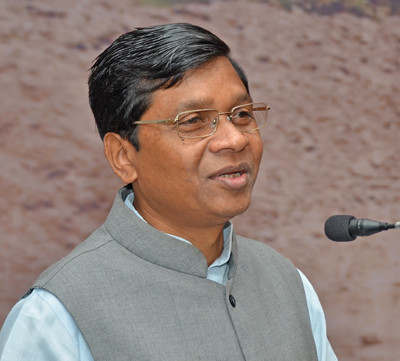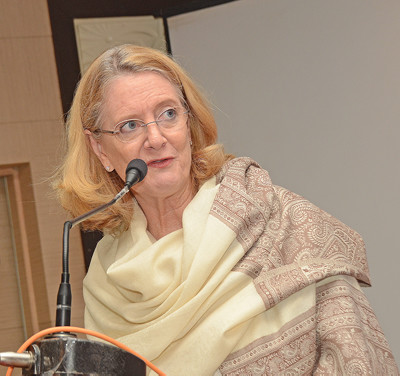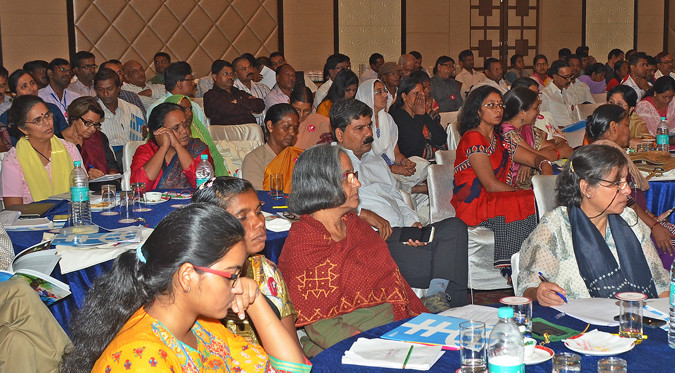Transforming the lives of rural women in India
Date:
Author: Rineeta Naik
Ranchi, India – “Rural women face multiple challenges, and it is therefore critical that we recognize and work towards gender transformative livelihoods,” said India’s Minister of State for Rural Development Sudarshan Bhagat at a two-day national consultation on ‘Gender Transformative Rural Livelihoods’ that took place in Ranchi in the eastern Indian state of Chhattisgarh on 3-4 November, 2015.

The consultation was organized by UN Women in partnership with the Ministry of Rural Development, Government of India. It reviewed trends in rural women’s work and their access to resources and entitlements, highlighted the importance of ensuring women’s dignity and security in all policies and programmes on rural livelihoods, and underscored women’s participation in the shaping of rural development strategies.
The participants heard from individual rural women as well as women’s coalitions, representatives from ministries and departments and civil society organisations, including members of the Mahila Kisan Adhikaar Manch (MAKAAM), a national alliance working on the rights of women farmers. Senior government functionaries from the states of Bihar, Haryana, Jammu and Kashmir, Maharashtra, Punjab, Tamil Nadu, Uttar Pradesh and West Bengal also attended the consultation.
In her opening remarks, UN Women Representative for India, Bhutan, Maldives and Sri Lanka Dr. Rebecca Reichmann Tavares observed that gender equality and women’s empowerment are key elements of the new global agenda for sustainable development adopted by United Nations Member States in September.

The Sustainable Development Goals, or SDGs, are “intrinsically linked to the lives of women and girls globally, including that of rural women, who are vital to its success,” Dr. Tavares said. “Empowering rural women is key not only to the well-being of individuals, families and rural communities, but also to overall economic productivity, given women’s large presence in the agricultural workforce.”
She commended the Ministry of Rural Development for its exemplary leadership in making gender issues central to its programmes and schemes and for being the first ministry in the Government of India to have adopted gender audit guidelines.

The participants also heard from Nilkanth Singh Munda, Minister for Rural Development, Government of Jharkhand, who applauded the joint effort by UN Women and the state government towards women’s rights and gender equality.
For more information please contact:
Rineeta Naik
Communications Analyst
UN Women MCO for India, Bhutan, Maldives and Sri Lanka
E-mail: [ Click to reveal ]
Background
In India, data from the 2011 Census shows that of the 405 million rural women in the country, nearly 80 per cent contribute to agriculture, and 60 per cent of all agricultural activity is carried out by women farmers. And yet, not more than nine per cent of rural women own land. Women farmers earn only 50-75 per cent of the wages earned by men. More than 50 per cent of rural women workers work without pay on family farms. More than 80 per cent of women farmers belong to marginalised communities such as Scheduled Castes, Scheduled Tribes, or Other Backward Castes.
In India, UN Women promotes the leadership and participation of rural women in shaping programmes on all issues that affect their lives, including improved food and nutrition security and better rural livelihoods. UN Women also engages with the government to develop and implement laws and policies that promote equal rights, opportunities and participation so that rural women can benefit from trade and finance, market their goods and make a strong contribution to inclusive economic growth.
With its mandate to eradicate rural poverty in India, the Ministry of Rural Development is in a unique position to transform the lives of India’s 405 million rural women. The focus of UN Women’s work with the Ministry has been to ensure:
- Increased participation of women in rural livelihoods programmes such as the Mahatma Gandhi National Rural Employment Guarantee Act (MGNREGA) through the creation of all-women worksites and the promotion of women-friendly works such as canal de-siltation, plantations, horticulture, fisheries and hatcheries.
- Women’s access to essential services such as PDS (public distribution service), job cards under MGNREGA, and social protection measures including widow, disability, old age pension and family benefit schemes under the National Social Assistance Programme.
- Greater awareness amongst women of their rights and entitlements through training of village organisations and women’s self-help groups.